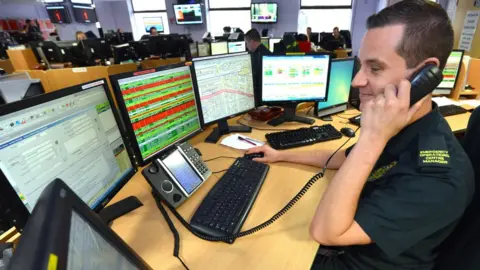South East Coast Ambulance 999 call delays 'could have led to deaths'
 Secamb
SecambDelays in answering 999 calls in south-east England may have contributed to two deaths and harmed other patients in the last year, a review has revealed.
The documents - which look at the impact of call answering on patient safety - have flagged up "significant issues" with staffing.
One caller was left on hold for 10 minutes, the review by South East Coast Ambulance Service (Secamb) said.
A Secamb spokesman said the trust was working hard to make improvements.
The documents reveal there were 10 investigations into "serious incidents" related to call answering delays in 2017-18.
Secamb said that out of those 10 incidents, two deaths may be directly related to the trust's involvement, although inquests have not yet taken place.
The trust papers were released after a Freedom of Information (FOI) request by the Health Service Journal.
Repeat callers
The documents state: "We aim to provide a minimum of just under 4,500 Emergency Medical Assistant hours a week as anything fewer will impact call answering. We currently do not achieve [this]."
It also described how a fast turnover of control room staff has caused "significant stability issues" and increased the burden on remaining staff.
And it added that year-to-date call demand was 10% higher than last year, mainly driven by repeat callers chasing arrival times, now running at one in five calls.
In a statement, Secamb said it took patient safety "very seriously" and encouraged staff to report any incident where they had concerns.
But it added that the raising of a serious incident "does not in itself indicate harm".
It said it was "working hard through a significant recruitment drive to improve recruitment and retention rates".
